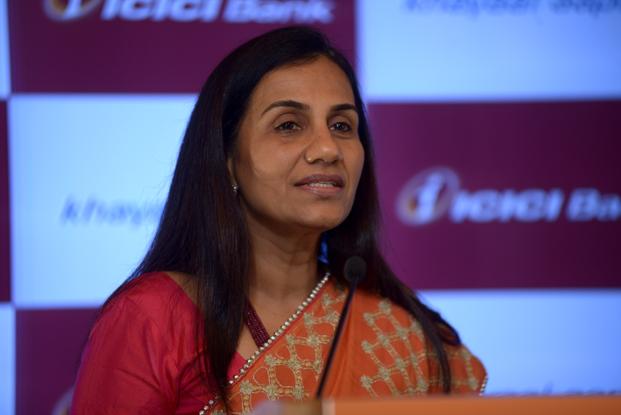Former ICICI Bank MD and CEO, Chanda Kochhar has approached the Bombay High Court challenging her termination by the Bank last year. The petition to be heard by a two-judge bench of Justices Ranjit More and M.S. Karnik, has stated that her request for early retirement had been accepted by the Bank with effect from October 4, 2019. After this, she ceased to be an employee of the Bank, and the latter ought not to have terminated Kochhar’s services.
The Bank had commissioned an enquiry against the former MD and CEO last year, following allegations of quid pro quo. The commission headed by retired Justice B.N. Srikrishna, and the Bank decided to terminate her services after the Justice Srikrishna Commission submitted its report, which had concluded that Kochhar had violated the Bank’s code of conduct in the Videocon loan case and had also failed to discharge her fiduciary functions to recuse herself to avoid any conflict of interest. The Bank has then stated that it would treat her exit as ‘Termination for Cause’ under its internal policies. This amounted to revocation of all her existing and future entitlements such as any unpaid amounts, unpaid bonuses or increments, unvested and vested & unexercised stock options, and medical benefits, and also the clawback of all bonuses paid from April 2009 to March 2018. Now, in the petition before the Bombay High Court, the decision to claw back her benefits in the said time period has also been challenged.
Trouble had started for Chanda Kochhar last year when she went on an indefinite leave in June 2018 following allegations of conflict of interest and quid pro quo in the Videocon loan case.
This had come as a major setback for Kochhar who enjoyed an illustrious career as a Banker, until these allegations came up. She had come a long way since 1984, when she had joined the ICICI Bank as a management trainee. According to the the ICICI official website, she was involved in Project Appraisal and Monitoring in her initial years, which was the core function in ICICI at that time.
She rose up the ranks very quickly, and when ICICI decided to enter commercial banking in the year 1993, she was a part of the core team to set up the Bank. In what shows her capability as a Banker, the official website also mentions that the Bank entered the retail finance sector in the year 2000 under the leadership of Kochhar, and within a period of 5 years, the Bank emerged as the biggest retail financer in India.
The Banker was appointed as the ICICI MD and CEO in the year 2009. She remained among one of the highest paid bankers in India during her stint as the ICICI MD and CEO which ended in an unfortunate manner. She was earning a basic salary of Rs. 2.67 crores at the end of the Financial Year 2017, showing how much she has achieved before allegations of quid pro quo were levelled, and she got involved in a controversy.
Throughout her career, she was repeatedly seen as one of the most influential businesswomen, not only in India but across the world. In the year 2004, she was named the Retail Banker of the Year (Asia-Pacific region) by The Asian Banker. Later in 2005, she was named the Business Woman of the Year 2005 by The Economic Times. She also found mention as one of the most powerful business women in the Fortune’s List time and again. In the year 2005 she was ranked 47th in Fortune’s List of Most Powerful Women in Business. She further rose to the 37th rank in the succeeding year and to the 33rd rank in the year 2007. In the year 2017, she was also ranked 32nd on the Forbes list of world’s most powerful women. She was even awarded the third-highest civilian honour, Padam Bhushan in the year 2011.
No one could have imagined that seven years later, there would be such a sharp twist triggering her downfall.
In the year 2016, allegations against her came up for the first time when shareholder and whistleblower, Arvind Gupta, writing on a blog, raised concerns for the first time, levelling allegations of impropriety in loan related decisions made by Kochhar. He alleged quid pro quo in loans to the Videocon group and also claimed that Kochhar’s husband Deepak Kochhar had business dealings with the promoter of the Videocon group.
Intially, it had seemed as if Chanda Kochhar would steer through the controversy untainted as the Bank had stated in March-2018 that it had reviewed internal processes for credit approval and ‘found them to be robust’. Bank’s board had also expressed faith in the former MD and CEO, and had also denied any wrongdoing on her part. Even any ‘conflict of interest’ was ruled out by the Bank.
A second whistleblower complaint came up, and this time the board changed its stance. An independent inquiry was instituted on May 30, 2018. Thereafter, the Justice Srikrishna panel indicted Chanda Kochhar leading to her downfall. Things have only kept getting worse for Kochhar, and earlier in the month of January this year, the CBI booked her and her husband along with some individuals from the Videocon group in the alleged quid pro quo loans scam, for criminal conspiracy and cheating.
The Videocon group is a dying Indian company, which has recently admitted to humongous outstanding claims, both to private and public lenders, amounting to a stupendous Rs. 90,000 crore. This is perhaps the biggest bankruptcy case in the country. And loan transactions with the troubled conglomerate seems to have brought about the downfall of Chanda Kochhar, who was once a leading Banker not only in India, but across the globe.
